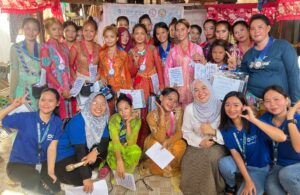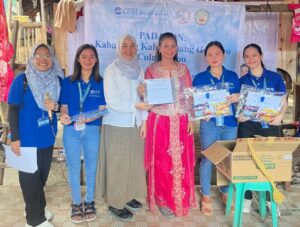 ILIGAN CITY – With the increasing urgency of addressing climate change and adolescent health challenges, the Children for Climate Action Project (CCAP)—implemented by Community and Family Services International (CFSI) and funded by the European Union—is creating meaningful opportunities for children and youth to participate in governance and advocacy within coastal and upland communities of Iligan City, Cotabato City, and Zamboanga City.
ILIGAN CITY – With the increasing urgency of addressing climate change and adolescent health challenges, the Children for Climate Action Project (CCAP)—implemented by Community and Family Services International (CFSI) and funded by the European Union—is creating meaningful opportunities for children and youth to participate in governance and advocacy within coastal and upland communities of Iligan City, Cotabato City, and Zamboanga City.
“We also dream for our children to go to school, so they won’t end up like us. We want to learn, too, so people won’t look down on us just because we are Bajau.”
Since its kickoff in November 2024, the project has begun organizing and strengthening youth groups in Barangays Tambacan and Rogongon in Iligan City, Tamontaka IV and V in Cotabato City, and Arena Blanco and Kasanyangan in Zamboanga City. Over 120 young leaders have been engaged to lead awareness initiatives on climate change adaptation and adolescent sexual and reproductive health and rights (ASRHR), aiming to reach more than 2,600 children and youth across the six target barangays.
During one youth engagement session in Barangay Tambacan, Iligan City, Ms. Minerva, a young Sama Bajau mother, expressed her determination to support her community’s growth.
“Naa pud mi pangarap sa among mga anak na maka-eskwela sila para dili sila maparehas sa amoa. Ganahan pud mi makabalo para dili lang gamay panan-aw sa among mga Bajau,” she said.
“We also dream for our children to go to school, so they won’t end up like us. We want to learn, too, so people won’t look down on us just because we are Bajau.”
Her words reflect the aspirations of many Indigenous and marginalized families—seeking education, dignity, and a voice in their community’s future.

CCAP works in close partnership with local government units (LGUs) through city-level offices such as the City Disaster Risk Reduction and Management Office (CDRRMO), City Youth Development Office (CYDO), City Planning and Development Office (CPDO), Gender and Development (GAD), and City Health Office (CHO), as well as barangay councils, NGOs, and private institutions. The project equips youth with knowledge and skills in climate resilience, child protection in emergencies, psychosocial first aid, and ASRHR, preparing them to lead awareness campaigns and actively engage in local planning.
Crucially, the project ensures that these youth groups are not only trained but also formally recognized as youth organizations by their respective barangay councils. This formal recognition paves the way for their eventual accreditation at the city level, allowing them to participate in governance spaces and contribute to the formulation of local policies and programs, particularly those related to climate adaptation and child protection.
CCAP affirms the critical role of young people not just as future leaders, but as current stakeholders and changemakers. By building their capacity and amplifying their voices—especially in geographically isolated Indigenous communities and climate-vulnerable urban areas—the project highlights the importance of inclusive, child-centered development and community-driven resilience.
–
Story by: Jehan Alioden

